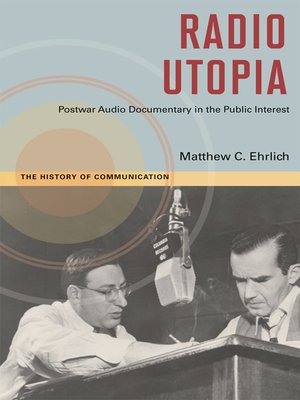Radio Utopia
ebook ∣ Postwar Audio Documentary in the Public Interest · The History of Media and Communication
By Matthew C. Ehrlich

Sign up to save your library
With an OverDrive account, you can save your favorite libraries for at-a-glance information about availability. Find out more about OverDrive accounts.
Find this title in Libby, the library reading app by OverDrive.



Search for a digital library with this title
Title found at these libraries:
| Loading... |
As World War II drew to a close and radio news was popularized through overseas broadcasting, journalists and dramatists began to build upon the unprecedented success of war reporting on the radio by creating audio documentaries. Focusing particularly on the work of radio luminaries such as Edward R. Murrow, Fred Friendly, Norman Corwin, and Erik Barnouw, Radio Utopia: Postwar Audio Documentary in the Public Interest traces this crucial phase in American radio history, significant not only for its timing immediately before television, but also because it bridges the gap between the end of the World Wars and the beginning of the Cold War. Matthew C. Ehrlich closely examines the production of audio documentaries disseminated by major American commercial broadcast networks CBS, NBC, and ABC from 1945 to 1951. Audio documentary programs educated Americans about juvenile delinquency, slums, race relations, venereal disease, atomic energy, arms control, and other issues of public interest, but they typically stopped short of calling for radical change. Drawing on rare recordings and scripts, Ehrlich traces a crucial phase in the evolution of news documentary, as docudramas featuring actors were supplanted by reality-based programs that took advantage of new recording technology. Paralleling that shift from drama to realism was a shift in liberal thought from dreams of world peace to uneasy adjustments to a cold war mentality. Influenced by corporate competition and government regulations, radio programming reflected shifts in a range of political thought that included pacifism, liberalism, and McCarthyism. In showing how programming highlighted contradictions within journalism and documentary, Radio Utopia reveals radio's response to the political, economic, and cultural upheaval of the post-war era.
|
Cover
Title page
Copyright
Contents
Acknowledgments
Introduction: Utopian Dreams
1. A Higher Destiny
2. One World
3. New and Sparkling Ideas
4. Home Is What You Make It
5. The Quick and the Dead
6. Hear It Now
7. Lose No Hope
Notes
Index
|
Received the Tankard Book Award from the Association for Education in Journalism and Mass Communication (AEJMC), 2012.
— Association for Education in Journalism and Mass Communication (AEJMC)
| Matthew C. Ehrlich is a professor of journalism at the University of Illinois at Urbana-Champaign and the author of Journalism in the Movies.
| Matthew C. Ehrlich is a professor of journalism at the University of Illinois at Urbana-Champaign and the author of Journalism in the Movies.






